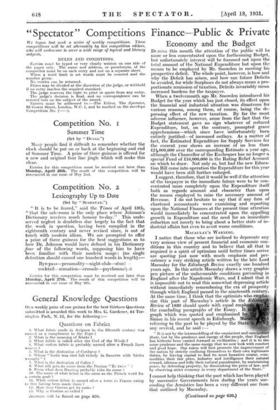Economy and the Budget
DURING this month the attention of the public will be more or less concentrated upon the forthcoming Budget, but unfortunately interest will be focussed not upon the total amount of the National Expenditure but upon the means to be employed by Mr. Snowden in meeting his prospective deficit. The whole point, however, is how and why the Deficit has arisen, and how can future Deficits be avoided, for while Surpluses do not always mean a pro- portionate remission of taxation, Deficits invariably-mean increased burdens for the taxpayer. When a twelvemonth ago Mr. Snowden introduced his Budget for the year which has just closed, its effect upon the financial and industrial situation was disastrous for various reasons, among them, of course, being the de- pressing effect of the new taxation. By far the most adverse influence, however, arose from the fact that the Budget statement gave no sign whatever of reduced Expenditure, but, on the contrary, prompted grave apprehensions—which since have unfortunately been entirely justified—of increased outlays. As a matter of fact, the Estimated Expenditure for Supply Services for the current year shows an increase of no less than £24,000,000 over the corresponding Estimate a year ago, although the Chancellor of the Exchequer has no longer a, special Fund of £16,000,000 in the Rating Relief Account on which to draw. Not only so, but had the new Educa- tion Bill come into operation the Expenditure for this year would have been still further enlarged. I suggest, therefore, that it would be well if the attention of the taxpayer in the immediate future were to be con- centrated more completely upon the Expenditure itself both as regards amount and character than upon the means employed to raise the necessary amount of Revenue. I do not hesitate to say that if any firm of chartered accountants were examining and reporting upon the National Finances at the present time attention would immediately be concentrated upon the appalling growth in Expenditure and the need for an immediate reduction not merely to bring about a better state of in- dustrial affairs but even to avert worse conditions.














































 Previous page
Previous page